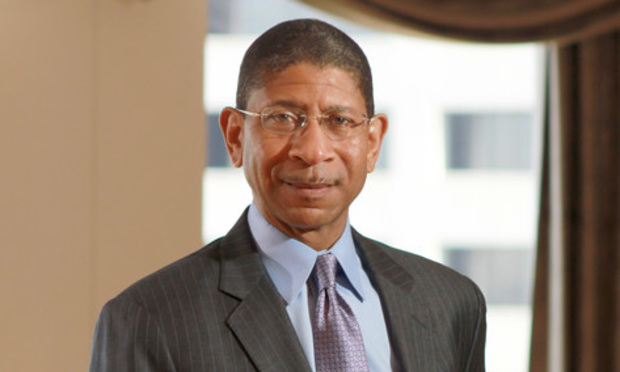Dealmakers of the Year: Douglass Selby
"Creative transactional lawyers help guide the principals in determining what is legally possible and any legal consequences of one structure or another."
June 19, 2019 at 02:00 PM
3 minute read
 Douglass Selby of Hunton Andrews Kurth, Atlanta (Photo: John Disney/ALM)
Douglass Selby of Hunton Andrews Kurth, Atlanta (Photo: John Disney/ALM)
Hunton Andrews Kurth partner Douglass P. Selby serves as co-head of the firm's national public finance team. With more than 20 years of experience serving as bond counsel, disclosure counsel and underwriter's counsel in more than $10 billion of municipal financing projects around the Southeast, Selby also has played a leading role in some of Atlanta's most prominent financing projects.
Selby is currently lead finance and structuring counsel for Atlanta's estimated $5 billion, 12 million square foot mixed use development in the Gulch-area of downtown Atlanta between the Mercedes-Benz Stadium and State Farm Arena. Among other recent accomplishments, Selby served as lead outside counsel in Atlanta's 24-month negotiations with the Atlanta Hawks NBA team, resulting in a $300 million public/private financing to fund extensive renovations to State Farm Arena, which also included documenting a 30-year team nonrelocation agreement ensuring the Atlanta Hawks remain in downtown Atlanta.
Selby also represents the 165-acre Assembly Community Improvement District and was lead finance/bond counsel in the first phase of the revitalization of the former Doraville General Motors Assembly Plant. This was the first CID Bond Financing of a Transit Oriented Development in Georgia.
How do “political issues” factor into the deals that end up on the table, if at all?
Political goals and priorities are part of many (most) of the public finance transactions in which I am involved; this is particularly true of economic development transactions such as the Atlanta Gulch Development, State Farm Arena renovation and Doraville's GM/Assembly Development. Our region has benefited from visionary political leadership, particularly from Atlanta mayors and state leaders, who have intentionally leveraged the government's economic development tools to extract private-sector commitments that advance political goals and priorities, including affordable housing, multiple decade commitments to retain professional sports franchises and fairness and inclusion in contracting opportunities for all citizens in the region.
Who was one of your mentors, and what did you learn from that person?
Judge Marvin Arrington Sr. and Kevin Ross are two of my early lawyer-mentors. From Marvin I learned the power of a “handwritten note” to convey sincerity and graciousness in business relationships. From Kevin I observed the way master legal practitioners become “legal counselors” providing clients with more than just what the law says by assisting them in considering business, political and legal implications in decision-making.
What is a misconception lawyers have about transactional law?
One misconception about deal lawyers is the extent to which the legal service that we perform is merely that of a scribe. Effective transactional lawyers form a core part of the business team as transactions are initially negotiated, before any documentation is drafted. Creative transactional lawyers help guide the principals in determining what is legally possible and any legal consequences of one structure or another.
This content has been archived. It is available through our partners, LexisNexis® and Bloomberg Law.
To view this content, please continue to their sites.
Not a Lexis Subscriber?
Subscribe Now
Not a Bloomberg Law Subscriber?
Subscribe Now
NOT FOR REPRINT
© 2025 ALM Global, LLC, All Rights Reserved. Request academic re-use from www.copyright.com. All other uses, submit a request to [email protected]. For more information visit Asset & Logo Licensing.
You Might Like
View All
Atlanta-Based Fearless Fund Ends Black-Only Entrepreneurial Grant Contest After Settling Civil Rights Lawsuit

Deal Watch: Latham, Weil Lead Home Improvement Deal; Dealmakers Face Election Headwinds
8 minute read
JetBlue-Spirit Airlines Planned $3.8 Billion Merger Dropped Due to Antitrust Concerns

Deal Watch: Kirkland, Akin Drive Energy Deals as Big Law Leans Into Sector for M&A
7 minute readTrending Stories
- 1'It's Not Going to Be Pretty': PayPal, Capital One Face Novel Class Actions Over 'Poaching' Commissions Owed Influencers
- 211th Circuit Rejects Trump's Emergency Request as DOJ Prepares to Release Special Counsel's Final Report
- 3Supreme Court Takes Up Challenge to ACA Task Force
- 4'Tragedy of Unspeakable Proportions:' Could Edison, DWP, Face Lawsuits Over LA Wildfires?
- 5Meta Pulls Plug on DEI Programs
Who Got The Work
Michael G. Bongiorno, Andrew Scott Dulberg and Elizabeth E. Driscoll from Wilmer Cutler Pickering Hale and Dorr have stepped in to represent Symbotic Inc., an A.I.-enabled technology platform that focuses on increasing supply chain efficiency, and other defendants in a pending shareholder derivative lawsuit. The case, filed Oct. 2 in Massachusetts District Court by the Brown Law Firm on behalf of Stephen Austen, accuses certain officers and directors of misleading investors in regard to Symbotic's potential for margin growth by failing to disclose that the company was not equipped to timely deploy its systems or manage expenses through project delays. The case, assigned to U.S. District Judge Nathaniel M. Gorton, is 1:24-cv-12522, Austen v. Cohen et al.
Who Got The Work
Edmund Polubinski and Marie Killmond of Davis Polk & Wardwell have entered appearances for data platform software development company MongoDB and other defendants in a pending shareholder derivative lawsuit. The action, filed Oct. 7 in New York Southern District Court by the Brown Law Firm, accuses the company's directors and/or officers of falsely expressing confidence in the company’s restructuring of its sales incentive plan and downplaying the severity of decreases in its upfront commitments. The case is 1:24-cv-07594, Roy v. Ittycheria et al.
Who Got The Work
Amy O. Bruchs and Kurt F. Ellison of Michael Best & Friedrich have entered appearances for Epic Systems Corp. in a pending employment discrimination lawsuit. The suit was filed Sept. 7 in Wisconsin Western District Court by Levine Eisberner LLC and Siri & Glimstad on behalf of a project manager who claims that he was wrongfully terminated after applying for a religious exemption to the defendant's COVID-19 vaccine mandate. The case, assigned to U.S. Magistrate Judge Anita Marie Boor, is 3:24-cv-00630, Secker, Nathan v. Epic Systems Corporation.
Who Got The Work
David X. Sullivan, Thomas J. Finn and Gregory A. Hall from McCarter & English have entered appearances for Sunrun Installation Services in a pending civil rights lawsuit. The complaint was filed Sept. 4 in Connecticut District Court by attorney Robert M. Berke on behalf of former employee George Edward Steins, who was arrested and charged with employing an unregistered home improvement salesperson. The complaint alleges that had Sunrun informed the Connecticut Department of Consumer Protection that the plaintiff's employment had ended in 2017 and that he no longer held Sunrun's home improvement contractor license, he would not have been hit with charges, which were dismissed in May 2024. The case, assigned to U.S. District Judge Jeffrey A. Meyer, is 3:24-cv-01423, Steins v. Sunrun, Inc. et al.
Who Got The Work
Greenberg Traurig shareholder Joshua L. Raskin has entered an appearance for boohoo.com UK Ltd. in a pending patent infringement lawsuit. The suit, filed Sept. 3 in Texas Eastern District Court by Rozier Hardt McDonough on behalf of Alto Dynamics, asserts five patents related to an online shopping platform. The case, assigned to U.S. District Judge Rodney Gilstrap, is 2:24-cv-00719, Alto Dynamics, LLC v. boohoo.com UK Limited.
Featured Firms
Law Offices of Gary Martin Hays & Associates, P.C.
(470) 294-1674
Law Offices of Mark E. Salomone
(857) 444-6468
Smith & Hassler
(713) 739-1250






